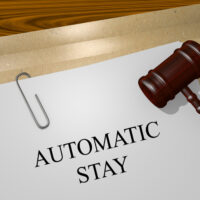What Is the Automatic Stay, and How Does It Work?

One of the most important protections afforded by filing for bankruptcy is the automatic stay. Learn more about how the automatic stay works, what it prevents, and the types of collections that aren’t stayed by bankruptcy, below.
Automatic stay basics
The automatic stay prevents your creditors from attempting to collect debts in existence at the time you filed for bankruptcy. The stay is very broad, preventing any phone calls, mailings, court actions, wage garnishments, or foreclosures while your bankruptcy case is ongoing. Once your debts are discharged, the stay becomes permanent regarding the discharged debts. The stay becomes effective as soon as you file for bankruptcy; as is implied by the name, you don’t have to do anything for the stay to take effect.
In some cases, creditors may request relief from the stay in court, which would allow them to continue to attempt to collect on a debt while the bankruptcy is ongoing. The creditors most often seeking relief from a stay are those with a secured debt, meaning that they have a lien on a piece of your property, such as your home or car. Your attorney can help you respond to these requests. Keep in mind also that, while a stay will prevent most foreclosures or repossessions from occurring during the bankruptcy itself, you will need to become current on payments owed on these pieces of property if you wish to continue to own them after your bankruptcy case is closed and the stay is lifted.
Types of collections unaffected by the automatic stay
Certain types of debt aren’t affected by the stay. For example, the government can continue auditing your tax returns or attempting to collect unpaid taxes during your bankruptcy. Additionally, if you’re delinquent on child support or alimony, actions to collect those debts can continue. If you’ve filed for bankruptcy in the past year, the stay might not apply to your debts. Your attorney can help you determine which debts won’t be stayed during your bankruptcy.
Act quickly to prevent further harm
If you are being sued based on a debt, it’s important to act quickly in filing for bankruptcy before creditors obtain a judgment against you, and especially before they can perfect that judgment by filing a lien against your home or other property. Once a lien is filed against property, the debt becomes secured and is much harder to eliminate in bankruptcy. Speak with an attorney as soon as possible if you are facing an unmanageable amount of debt.
If you’re facing a growing amount of medical, credit card, or other consumer debt and need help determining if bankruptcy could be the right choice for you, contact the Hudson Valley bankruptcy attorneys at Rusk, Wadlin, Heppner & Martuscello, LLP for a consultation, in Kingston at 845-331-4100, or in Marlboro at 845-236-4411.